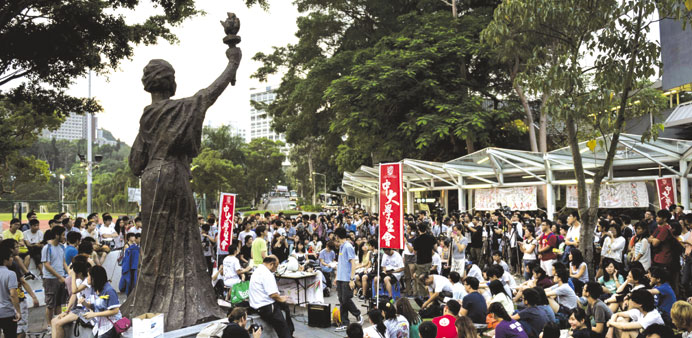Students at the Chinese University of Hong Kong meet yesterday next to a replica of the ‘Goddess of Democracy’ statue to discuss a possible student strike.
Hong Kong students yesterday announced plans to hold a week-long strike in response to Beijing’s refusal to grant the semi-autonomous city full universal suffrage.
The move came as a major financial backer of the pro-democracy group that has vowed to take over the city’s streets said the axing of his long-running newspaper column was politically motivated.
Activists in the former British colony had their hopes for genuine democracy crushed after China announced last Sunday that the city’s next leader would be vetted by a pro-Beijing committee.
The top committee of China’s rubber stamp parliament said Sunday Hong Kong citizens will be allowed to elect their next leader in 2017 - but candidates must be approved by a pro-Beijing committee, with only two to three contenders allowed to stand.
A coalition of pro-democracy groups have vowed to usher in a new “era of civil disobedience” against the decision, calling on the people of Hong Kong to blockade major thoroughfares in the city’s financial district.
Students plan to walk away from classes on September 22 in what they described as a final warning before wider civil disobedience action.
The proposal still needs to be approved tomorrow by a coalition of student groups and unions, leaders said.
“We strike as an ultimatum to warn the government to listen to our opinions,” president of the Hong Kong University (HKU) student union Yvonne Leung told AFP.
In the afternoon students from Chinese University of Hong Kong met next to a replica of the ‘Goddess of Democracy’ statue on the university’s campus - a throwback to the student-led movement in Beijing that was brutally crushed 25-years ago.
The original statue became a rallying point for pro-democracy supporters in Tiananmen Square and was destroyed in the crackdown.
“We have to make our voices heard, to show the Communist Party we’re not afraid, to show them we care about what happens in Hong Kong,” 21-year-old Hazel Ng said.
“I want to strike exactly because I love China, free elections will be good for the entire country,” added 21-year-old Eddie Mung, a fourth year nursing student added.
As the students met, hedge-fund manager Edward Chin, a wealthy backer of the Occupy Central movement that has threatened civil disobedience called on locals to “uphold” media freedom in the city during a press conference at the Foreign Correspondents’ Club.
Chin said the loss of his column in the Hong Kong Economic Journal illustrated how the city’s media was under constant attack from mainland authorities.
“I think my column was axed because of political pressure from Beijing,” Chin, who is the head of a group of some 80 bankers and finance workers who support Occupy Central.
The paper has previously said the weekly finance column was cut due to a page redesign, not for political reasons.
But Chin said the Economic Journal had become more pro-establishment since he first started contributing in 2006.
A respected Chinese-language financial newspaper, the paper was bought by Richard Li, the younger son of Asia’s richest man Li Ka-shing, in 2006.
“If we want to criticise the establishment, whatever you wrote will be edited. It’s a sad story for journalism and Hong Kong,” Chin said calling on locals to “uphold whatever was left” of the city’s media independence.
Concerns over press freedom have grown this year following several attacks on local media workers and accusations Beijing-critical papers have suffered advertising boycotts.
The former editor of a respected liberal newspaper, Kevin Lau, was savagely stabbed in broad daylight in February.
Jimmy Lai, publisher of the popular and often anti-Beijing Apple Daily, is also currently under investigation by the city’s anti-graft agency.

